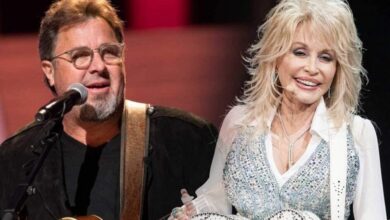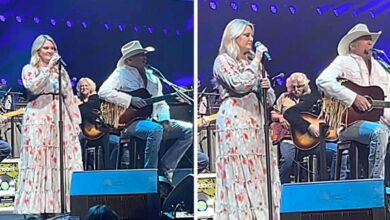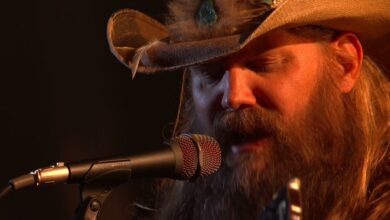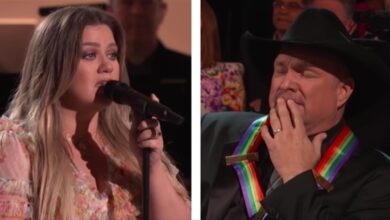Eddy Arnold And LeAnn Rimes Showcased A Remarkable Yodeling Battle In Their “Cattle Call” Performance
“Cattle Call” stands as a timeless melody that captures the spirit of the American cowboy. Recorded in 1944 by Eddy Arnold, this song signifies an era when country music began to morph and adapt while still holding tight to its roots. Eddy Arnold, often dubbed the “Tennessee Plowboy,” was a seminal figure in the country music scene, known for his smooth vocal stylings and ability to weave stories through his songs. His rendition of “Cattle Call” is a prime example of his artistic prowess, blending traditional country elements with the burgeoning Western swing sound that was gaining traction during that period.
At the heart of “Cattle Call” is the lonesome yet spirited lifestyle of a cowboy, depicted through vivid imagery that draws listeners into the vast landscapes of the West. The lyrics narrate the daily routines and challenges faced by ranchers, creating a strong connection between the audience and the cowboy’s way of life. Arnold’s delivery—marked by both a gentle lilt and an engaging yodel—enhances the storytelling aspect, allowing listeners to immerse themselves in the experience of the open range, cattle drives, and the camaraderie among ranch hands.
The song’s success is reflected in its climb to the top of the Billboard Juke Box Folk Records chart, achieving the number one position in 1945. This accomplishment not only underscored Arnold’s appeal but also indicated a cultural shift where the stories of cowboys began to resonate with a wider audience, transcending geographic boundaries. The engaging melody paired with relatable themes of hard work, loyalty, and freedom struck a chord during a time in American history when such values were widely celebrated.
Although Eddy Arnold was instrumental in the song’s initial reception, “Cattle Call” has since become a beloved classic, covered by a variety of artists across several decades. Notable among these is Elvis Presley, who introduced the song to a new generation in 1969 with his version on the album “From Elvis in Memphis.” Presley’s interpretation infused the original with a rock and roll flair, showcasing how “Cattle Call” could evolve and appeal to diverse musical tastes. This adaptability has allowed the song to remain relevant, illustrating the interconnectedness of different genres and the universality of its themes.
The song’s enduring popularity speaks volumes about its cultural significance. Even today, “Cattle Call” is performed at country music festivals and concerts, often eliciting nostalgia and evoking fond memories for audiences who may have grown up with the classic sounds of country music. It acts as a bridge connecting generations, allowing younger audiences to discover the roots of the genre while simultaneously providing older fans a sense of reminiscence and connection to their heritage.
Eddy Arnold’s influence extended beyond just “Cattle Call.” With a musical career that lasted from the 1940s well into the 2000s, he accumulated numerous hits and accolades, earning a place as one of country music’s first superstars. His style blended elements of traditional country with pop influences, leading to a polished sound that gained popularity beyond the traditional country audience. Arnold’s innovations were significant in paving the way for future artists who sought to explore the boundaries of country music.
As the cultural landscape of America continues to evolve, the cowboy archetype—reflected powerfully in “Cattle Call”—remains a significant symbol of independence, resilience, and adventure. The imagery and themes within the song resonate with a sense of nostalgia for simpler times and an appreciation for the hard-working individuals who helped shape American society. This attachment to cowboy culture ensures that songs like “Cattle Call” remain vital parts of the music tapestry, celebrated for their ability to evoke strong emotions and represent distinctly American stories.
Moreover, the song’s melody and lyrics have been embraced in various media forms, reinforcing its place in the broader narrative of Americana. “Cattle Call” has appeared in films, on television shows, and in popular media, ensuring the cowboy story continues to be told and retold. Each new interpretation adds another layer to its already rich heritage, allowing artists to reinterpret and share their own relationship with the lyrics and themes.
As time marches forward, “Cattle Call” remains not only a song about cowboys but a song that is emblematic of the human experience. Its capacity to encapsulate longing, adventure, and the rugged beauty of the American West ensures its legacy endures. Through the decades, music lovers have found solace and joy in its melody, reinforcing the idea that the values espoused in country music—hard work, loyalty, and passion—are as timely and relevant today as they were at the song’s inception.
In summary, “Cattle Call” transcends its status as a mere song; it embodies a significant piece of music history, encapsulating the essence of country music while telling an important story of the American West. Its lasting impact reflects the artistry of Eddy Arnold and the collective memory of the cowboy lifestyle, ensuring that the song will continue to resonate with audiences for many years to come. The narrative woven through its lyrics speaks not only of cattle and cowboys but of the shared experiences and values that unite people across different times and cultures.





